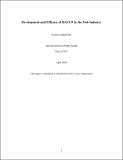| dc.contributor.advisor | Peter Hutt | en_US |
| dc.contributor.author | VanDerkruik, Rachel | |
| dc.date.accessioned | 2012-06-03T10:35:18Z | |
| dc.date.issued | 2010 | |
| dc.identifier.citation | Rachel VanDerkruik, Development and Efficacy of HACCP in the Fish Industry (April 2010). | en_US |
| dc.identifier.uri | http://nrs.harvard.edu/urn-3:HUL.InstRepos:8822181 | |
| dc.description.abstract | HACCP is a science-based system of preventive controls for food safety that commercial seafood processors develop to identify potential food safety hazards and implement to keep them from occurring. The FDA Seafood HACCP program was designed to increase the margin of safety that consumers already had and to reduce those illnesses that do occur to the lowest possible levels. This paper will describe the development of HACCP within the Seafood Industry and provide a brief overview of what is involved with this system. The implications of the complexity of the fish industry will be discussed in comparison with the meat and poultry industry, which is under a different HACCP program dictated by the USDA. The impact of HACCP on international trade has varied among countries, with developing countries requiring some external support for implementation. Several criticisms and compliments of the seafood HACCP program will be discussed, along with a look at the direction of this program in the near future. | en_US |
| dash.license | LAA | |
| dc.subject.other | Food and Drug Law | en_US |
| dc.title | Development and Efficacy of HACCP in the Fish Industry | en_US |
| dc.type | Paper (for course/seminar/workshop) | en_US |
| dc.date.available | 2012-06-03T10:35:18Z | |


